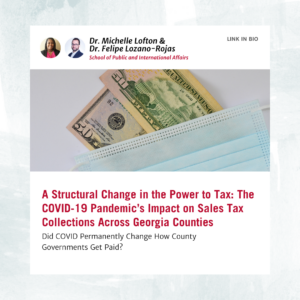
By Melody Herrington
As scholars grapple with the long-term economic shifts caused by the COVID-19 pandemic, one set of SPIA researchers has identified what may be permanent changes to the tax bases of local governments.
In “A Structural Change in the Power to Tax: The COVID-19 Pandemic’s Impact on Sales Tax Collections Across Georgia Counties” (forthcoming in Municipal Finance Journal), Assistant Professors of Public Administration and Policy Michelle Lofton and Felipe Lozano-Rojas examine how the shift from traditional (retail/tourism) to modern (e-commerce) sales tax collection methods, kicked into overdrive by lockdowns, affected revenue for county governments that receive local option sales taxes.
Since the 1970s, local governments in Georgia have been authorized, upon voter approval, to levy a one-percent general-purpose Local Option Sales Tax (LOST) (later followed by others, such as SPLOST, T-SPLOST, E-SPLOST, and MARTA). Literature on public finance has supported the importance of this revenue source, typically limited to sales by brick-and-mortar retailers made within physical county borders. Meanwhile, the so-called “fiscal resilience” of county governments drew attention during the 2008 global economic collapse, when unemployment and falling housing values constricted their revenues.
“Generally, local governments rely on a few tax bases,” said Lofton. “The biggest is property tax, then the sales tax, then fees and service charges. Very few levy income tax. For this reason, when the Great Recession hit the housing sector and people’s jobs, it was very detrimental to local governments. Some argue that they learned from that experience, figuring out ways to generate revenue and be less vulnerable to shocks.”
One such solution arose in 2018. In response to the rise in online shopping, the U.S. Supreme Court (South Dakota v. Wayfair) expanded states’ abilities to collect e-commerce sales taxes even without the seller’s physical local presence, a benefit for local governments without a strong retail base.
While the pandemic recovery was shorter and less painful than its Great Recession predecessor, perhaps due to federal support from the CARES Act and the Municipal Liquidity Facility, it revealed what may be permanent shifts to the structure of county tax bases, Lozano and Lofton found.
Their study, using 2016-2021 data from the Georgia Department of Revenue, first ranked Georgia counties by retail/tourism earnings per capita. Next, they used 2018 American Community Survey data to rank counties by broadband access (as a proxy for e-commerce, since aggregate data on internet purchases was unavailable). Their analysis revealed that counties with the top-performing traditional collection methods experienced the most post-COVID decline in sales tax revenues per capita (retail dropped 14% and tourism dropped 12%).
However, those counties with the highest prior broadband access, representing online sales, increased their sales tax revenues by about 8.5% during the same period. Counties with greater broadband access than might be expected according to their economic conditions enjoyed the most resilience, Lofton and Lozano found.
“Our empirical findings,” said Lozano, “suggest that some counties traditionally disadvantaged in their sales tax collections prior to the onset of the COVID-19 pandemic, often suburban or rural areas without larger retail centers (e.g., Chattahoochee), benefited from access to the local option sales tax to generate higher levels of sales tax collections from residents shopping locally, especially when greater access to e-commerce opportunities was available. Meanwhile, counties relying on tourism or brick-and-mortar retail centers (e.g., Appling) experienced a decrease on their tax collections.”
The pandemic led many shoppers to make essential purchases, such as groceries, locally, rather than traveling to traditional retail centers outside of their county, while online shopping soared.
“This trend of moving towards more e-commerce purchases and collection is not new, but was accelerated during COVID,” Lozano pointed out. “We argue that this is one of the sources that helped several local governments with non-traditional tax bases avoid a worse economic condition. Further, these changes, we found, are somewhat permanent: they experienced the shock at the onset of COVID, but then leveled off at a different point compared to pre-COVID collections.”
“Georgia has a lot of rural counties without large retail spaces that are losing out on sales tax revenue as residents travel outside the county to make purchases,” added Lofton. “After South Dakota v. Wayfair, they were able to generate that revenue in their county, generating sales tax on online purchases in addition to local purchases. This paper investigates whether there has been a long-term shift in the way that these local governments could then tax: they get some revenue from local option sales taxes that would not otherwise be available, especially if residents have more access to online shopping opportunities.”
But will local governments be capable of taking advantage of the new preferences of buying more online?
“If we change our preference for online shopping, then people are probably going to be more tolerant to changes on tax rates without really having to go back to brick-and-mortar,” said Lozano. “I think the mid-term response [to our findings] might be that some local governments make use of their statutory capacity to tax people. But that empiric question is untested.”
“Again, we think this might be a permanent shift on the power to tax, and therefore the sales tax revenue patterns, given that timeframe we have,” said Lofton. “We found a stable but lower shift in areas with large retail earnings or large tourism locations, while places with greater prior disposition for broadband access were able to keep [that shift] at a higher level.”
The study only covered Georgia counties, and Georgia was locked down for a shorter time than most states. The authors encourage follow-up studies to track this dynamic in other states and across the private sector.
“These shifts in behavior might have been even more drastic in places discouraged from economic activity for a longer period, in which shoppers further adjusted their local shopping patterns,” said Lofton. “Also, Georgia has a robust local option sales tax compared to other states, where lower LOST rates would mean lower earnings from online purchases.”









